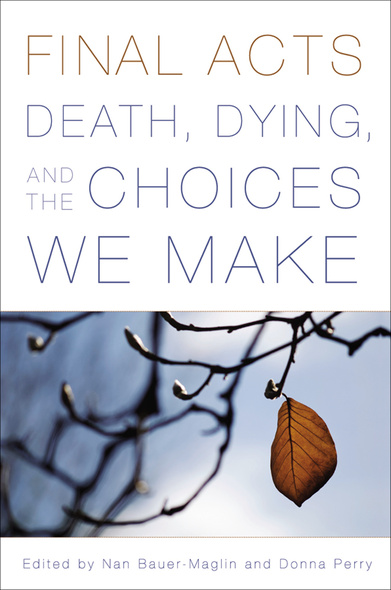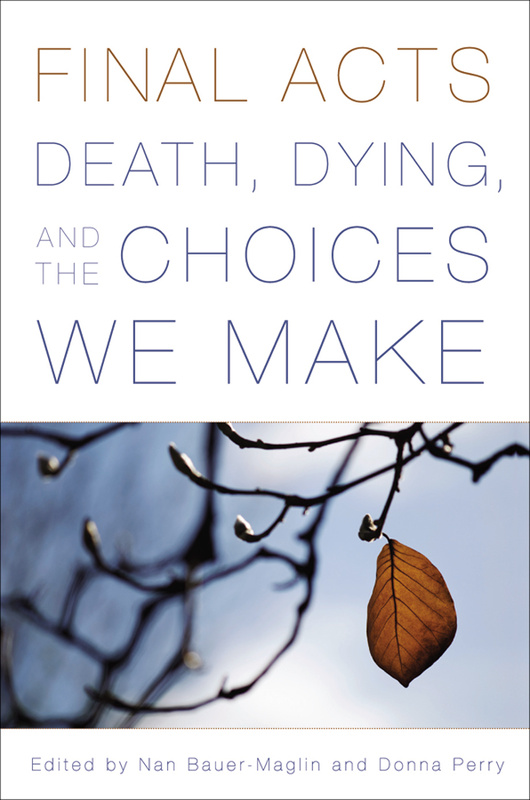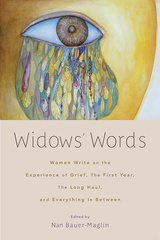Final Acts
Death, Dying, and the Choices We Make
Contributors include patients, caretakers, physicians, journalists, lawyers, social workers, educators, hospital administrators, academics, psychologists, and a poet, and among them are ethicists, religious believers, and nonbelievers. Some write moving, personal accounts of "good" or 'bad" deaths; others examine the ethical, social, and political implications of slow dying. Essays consider death from natural causes, suicide, and aid-in-dying (assisted suicide).
Writing in a style free of technical jargon, the contributors discuss documents that should be prepared (health proxy, do-not-resuscitate order, living will, power of attorney); decision-making (over medical interventions, life support, hospice and palliative care, aid-in-dying, treatment location, speaking for those who can no longer express their will); and the roles played by religion, custom, family, friends, caretakers, money, the medical establishment, and the government.
For those who yearn for some measure of control over death, the essayists in Final Acts, from very different backgrounds and with different personal and professional experiences around death and dying, offer insight and hope.
Final Acts provides the reader with persuasive and enlightening views on the controversial complex issues that are illustrated in the personal stories. It is a collection of moving stories and compelling essays.
If there's one profound lesson to be learned from Final Acts, it is that most of us are woefully uninformed and unprepared to make wise end-of-life choices. A good place to begin is by reading this book.
The essays in Final Acts offer all manner of paths, exploring a new relationship with death. Wise and gentle guides, Bauer-Maglin and Perry reveal meaning and purpose in the journey.
An insightful, complex, and pragmatic 'how-to' guide for dying in the Western world. Final Acts a is strong, well-composed, and balanced tool kit to help us all not only change our system to better maintain the integrity of the dying, but to enter into the end of life with confidence and control.
Final Acts provides the reader with persuasive and enlightening views on the controversial complex issues that are illustrated in the personal stories. It is a collection of moving stories and compelling essays.
If there's one profound lesson to be learned from Final Acts, it is that most of us are woefully uninformed and unprepared to make wise end-of-life choices. A good place to begin is by reading this book.
The essays in Final Acts offer all manner of paths, exploring a new relationship with death. Wise and gentle guides, Bauer-Maglin and Perry reveal meaning and purpose in the journey.
An insightful, complex, and pragmatic 'how-to' guide for dying in the Western world. Final Acts a is strong, well-composed, and balanced tool kit to help us all not only change our system to better maintain the integrity of the dying, but to enter into the end of life with confidence and control.
Donna Perry, a professor of English, teaches literature, writing, and women's studies courses at William Paterson University. She is the editor of Backtalk: Women Writers Speak Out and coeditor (with Nan Bauer-Maglin) of "Bad Girls/Good Girls": Women, Sex, and Power in the Nineties (Rutgers University Press).
Ruthann Robson, Notes on My Dying
June Bingham, Live Better or Longer?
Nancy Barnes, "Life which is ours to know just once"
Susan Perlstein, Caregiving Beulah
Sara M. Evans, E-mails to Family and Friends
Carol K. Oyster, Whose Death Is It, Anyway?
Jean Levitan, The Family Tree
Mimi Schwartz, Elegy for an Optimist
Alan Pope, Buddhist Reflections on Life and Death
Mary Jumbelicm, Death as My Colleague
Part II: Perspectives on Death and Dying
Stephen P. Kiernan, The Transformation of Death in America
Kathryn Temple, Unintended Consequences
Natalie R. Hannon, The Ethics Committee
Candace Cummins Gauthier, Ethical Principles for End-of Life Decision Making
Cherylynn MacGregor, Life or Death
Kathryn L. Tucker, Empowering Patients at the End of Life
Philip Nitschke and Fiona Stewart, Dying Down Under
Margaret Cruikshank, Ageism As It Affects Late-Life Choices
Ira Byock,Physician-Assisted Suicide
Marge Piercy, End of days






